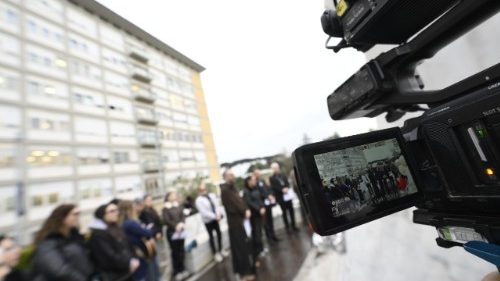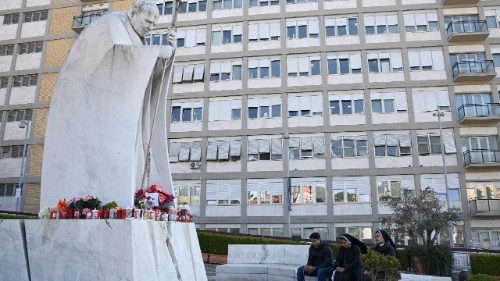Dilemma of the Work
Church Dilemma

In fact, I should say “the dilemma of the Church”, given the deep division that, both at the level of the hierarchy and among the faithful, the recent publication of “Fiducia supplicans” generated. But I am going to stick to the reality of Opus Dei, which is what I know what I strive to live. A few days ago I published an article about said document from the Congregation for the Doctrine of the Faith, which in turn generated a lot of controversy: some liked it a lot, others deeply disliked it. Beyond the limitations of my text, I was able to perceive a deep spiritual crisis that some – I think quite a few – people in the Work are suffering.
Personally, I believe that the faithful of Opus Dei are going through a difficult process. A kind of “error in the program”, “that’s not how the program runs.” Why? Because the teaching of Saint Josemaría is very correct doctrinally: his famous “Three Bells” that he wrote in 1973 and 1974, in the context of a serious post-conciliar crisis in the Church, are particularly eloquent in this regard. Let’s say that, in them – three letters addressed to the faithful of Opus Dei -, with a clairvoyant prudence of government, in the face of the generalized chaos he “gave up his moorings”, he closed, so to speak, doctrinally the Work by name and song, relying exclusively in the official doctrine of the Church: Saint Thomas Aquinas and the ecclesiastical Magisterium. Recently, the book published by José Luis González Gullón and John F. Coverdale, “History of Opus Dei” recognizes that, although these measures were necessary at the time, with the passage of time they produced a certain stagnation in the theology developed by faithful of the work.
But the teaching and pastoral praxis of Saint Josemaría start from an assumption: “the Pope is orthodox”, “the Pope is the guarantor of orthodoxy”, “the doctrine is right if, and only if, it is in line with the Pope “. But what if a Pope is not so “orthodox”? Who then defines what is orthodox or not? Is it the truth, discovered by each person, and, therefore, our own criteria? Or should our criteria be docile and humble and submit to the Pope’s teaching, even if it seems to us that he is going astray doctrinally? I believe that Saint Josemaría himself, if he found himself in this situation, would face an insoluble dilemma, in which he would only be able to remain silent, pray and wait. When he wrote “Three Bells” he was facing the painful crisis of the post-council, where there was great confusion and doctrinal ambiguity in the Church and at the highest level, cardinals included. But now he is the Pope, and so the program does not run. And it is obvious that the doctrine of Francis, in practice, although one wants to make it seem otherwise, is not in line with that of Saint Josemaría, although an essential part of that of Saint Josemaría is to follow the Pope unconditionally (and, wow! that Francisco has mistreated us!).
It is necessary that I be understood. It is false to state simply and simply that the teachings of Saint Josemaría and those of Pope Francis are divergent and incompatible. This is not the case, because both deeply love Christ, the Church and souls. Therefore, points of conciliation can always be sought; for example, Saint Josemaría’s phrase “of 100 souls we are interested in 100”, can be seen materialized in “Fiducia supplicans”. But – there is a but – Saint Josemaría would never have sought ecclesial closeness with those people in that way. The underlying similarities between Francis and Saint Josemaría could continue. There is one that fills me with great peace: both have a deep love and great trust in the Virgin. But what they differ is in the ways; The goal is the same, the path is different. Saint Josemaría is more concerned with doctrinal correctness, Francis with the pastoral dimension of the Church.
For my part, I have tried to follow the criteria of the Prelate of the Work and his Auxiliary Vicar: support the Pope. In fact, the Auxiliary Vicar at the time called for attention to some faithful of the Work who, respectfully, questioned the doctrinal correctness of chapter VIII of Amoris laetitia, such as Ettore Gotti Tedeschi or Scott Hahn. This has been an intellectual challenge for me. For example, upon hearing about the publication of “Fiducia supplicans” through the news and before reading the text, I thought: “why doesn’t he resign now?” (Saint John Paul II died at the age of 84, almost 85; Benedict XVI resigned at 85; Francis is 87 and regularly religiously asks the prelates of the Church to resign at 75), who really manages the Church when the one who directs it is an 87-year-old man? That is to say, when faced with documents like this, I personally have to make an effort to ensure that “I don’t get wallowed in the wave, but rather surf it.” This implies, in practice, deconstructing some ways and forms that I learned from Saint Josemaría, to assimilate those of Francis. And, the truth is, I have finally discovered the good side of the Pope. At the end of the day, if I do it, it is to be faithful to Saint Josemaría and to follow the instructions of the one who now represents him, his Prelate.
I must confess that Francis’ government decisions often fill me with uncertainty and concern, but his writings fill me with consolation and hope. That has been the case of “Fiducia supplicans”. And yes, for my part, I try to change my “chip”, which means recognizing, in fact, that in the Work we have perhaps for a long time been somewhat – a lot? – rigid, and Francisco is teaching us not to be so.
Related

Pope Francis spent a peaceful night
Exaudi Staff
02 March, 2025
1 min

Pope Francis has had a peaceful night
Exaudi Staff
25 February, 2025
1 min

What should the boyfriend or girlfriend I should find be like?
Patricia Jiménez Ramírez
24 February, 2025
4 min

The Pope spent a quiet night at Gemelli
Exaudi Staff
23 February, 2025
1 min
 (EN)
(EN)
 (ES)
(ES)
 (IT)
(IT)

